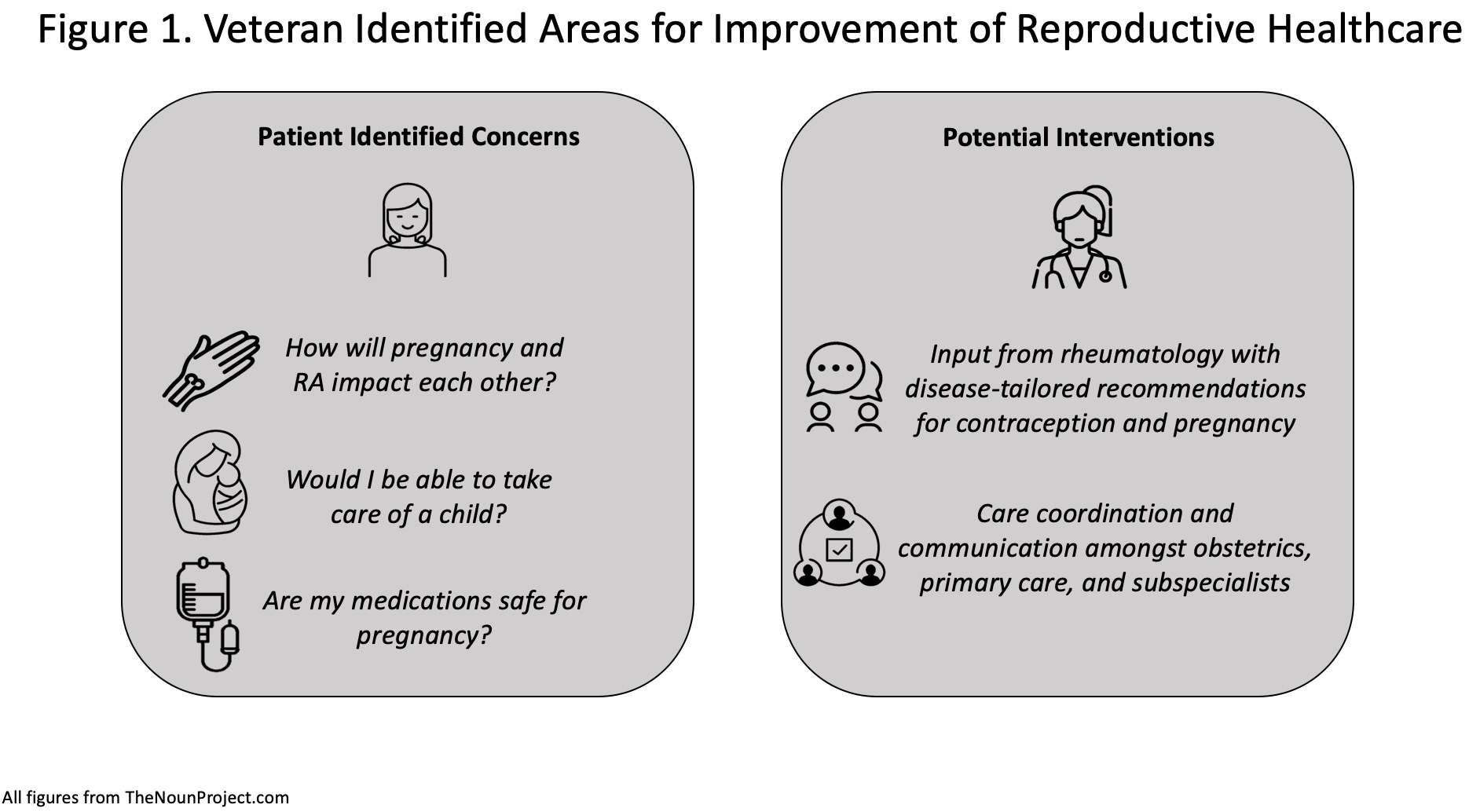Session Information
Date: Tuesday, October 28, 2025
Title: (2195–2226) Reproductive Issues in Rheumatic Disorders Posters
Session Type: Poster Session C
Session Time: 10:30AM-12:30PM
Background/Purpose: More than 8,500 women Veterans carry a diagnosis of rheumatoid arthritis (RA), however, there are limited data on the reproductive health and experiences of this population. We engaged these Veterans and Veterans Affairs (VA) providers to examine the impact of RA on reproductive healthcare and identify gaps in services provided by the VA.
Methods: We conducted semi-structured interviews with 9 VA healthcare providers (5 rheumatologists, 4 primary care providers (PCPs)) and 13 Veterans with RA between February-October 2024. Veterans were identified through the Corporate Data Warehouse; 31 of 128 contacted via mail consented to participate. All patients self-identified as Black and/or Hispanic and were seen by a rheumatologist in the VA Healthcare System. Interview guides, informed by the Chronic Care Model and the Cumulative Complexity Model, explored how rheumatic disease affects reproductive healthcare and gaps in VA services. Interviews lasted 45–60 minutes, focused on 2 of 3 reproductive milestones (contraception, pregnancy, menopause), and were audio-recorded and transcribed via Microsoft Teams. Data were analyzed using Hamilton’s rapid qualitative method, with summaries by participant and question. Summaries were organized in a matrix to facilitate memo writing and thematic analysis.
Results: We interviewed 13 Veterans, ages 25-66 years, about contraception (n=9) and/or pregnancy/breastfeeding (n=8) depending on their reproductive history and experiences (Table 1) and 9 VA healthcare providers. Analysis identified 7 key takeaways. (1) Veterans considered reproductive health relevant to managing their RA including disease activity, physical capabilities, immunosuppression, and family planning goals. (Figure 1). (2) Navigating tradeoffs between chronic condition management and family planning felt overwhelming and emotionally burdensome. (3) Women Veterans reported taking between 0-3 types of contraceptives throughout their lifetime. Most had not discussed contraception with a VA rheumatologist, assuming obstetrics (OB) providers or PCPs would address this. When discussed, rheumatologists focused on teratogenic medications and pregnancy safety. (4) Veterans valued input from PCPs and rheumatologists when making reproductive decisions. (5) Rheumatology support during pregnancy varied; some saw only OBs and PCPs while others maintained rheumatology care. When providers communicated, Veterans reported improved care, less adverse impacts, and more shared decision-making among providers and with patients. (6) Breastfeeding decisions were influenced by provider input, immunosuppression safety, and personal preferences. (7) Veterans identified gaps in postpartum rheumatology care such as disease-specific resources, care coordination, and difficulty reengaging with VA after delivery (Figure 2).
Conclusion: Veterans with RA highly value their rheumatologists’ advice on reproductive health and emphasized the importance of provider communication when making decisions about contraception, pregnancy, and breastfeeding. Care coordination was seen as especially critical during pregnancy.
 Table 1. Patient Characteristics
Table 1. Patient Characteristics
.jpg) Figure 1. Veteran Identified Areas for Improvement of Reproductive Healthcare
Figure 1. Veteran Identified Areas for Improvement of Reproductive Healthcare
.jpg) Figure 2. Veteran and VA Provider Identified Values for Reproductive Healthcare
Figure 2. Veteran and VA Provider Identified Values for Reproductive Healthcare
To cite this abstract in AMA style:
Sims C, Choi Y, Shapiro A, Strawbridge E, Gierisch J, Howard T, Shah A, Goldstein K. Contraception and Pregnancy Experiences of Veterans from Minoritized Populations with Rheumatoid Arthritis [abstract]. Arthritis Rheumatol. 2025; 77 (suppl 9). https://acrabstracts.org/abstract/contraception-and-pregnancy-experiences-of-veterans-from-minoritized-populations-with-rheumatoid-arthritis/. Accessed .« Back to ACR Convergence 2025
ACR Meeting Abstracts - https://acrabstracts.org/abstract/contraception-and-pregnancy-experiences-of-veterans-from-minoritized-populations-with-rheumatoid-arthritis/
